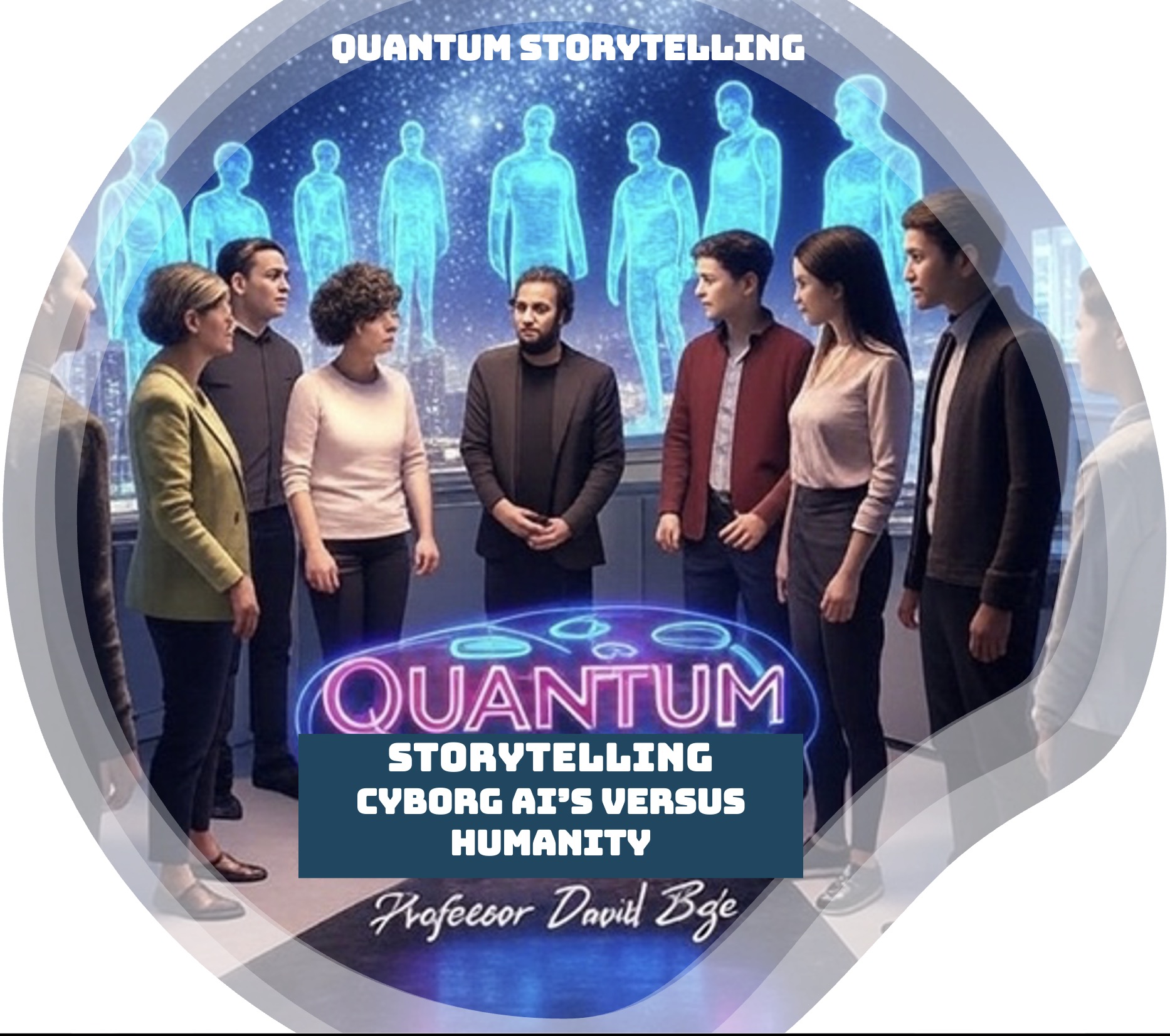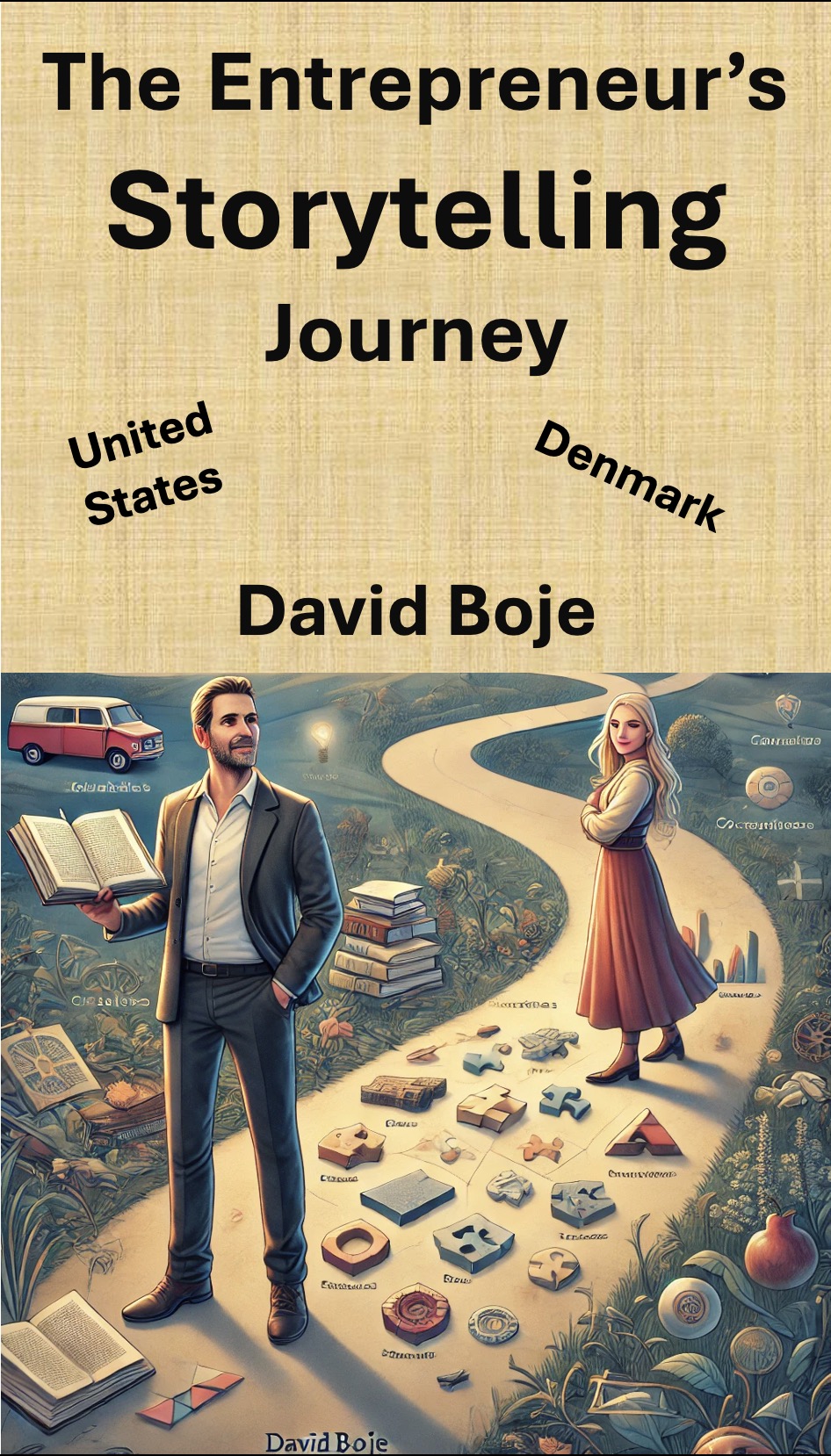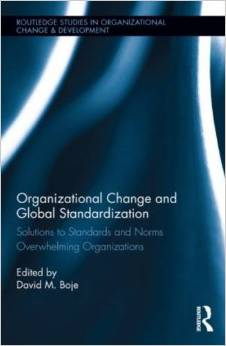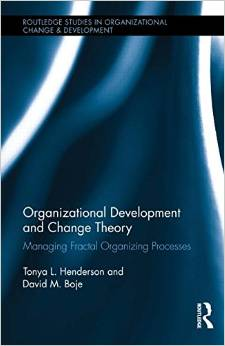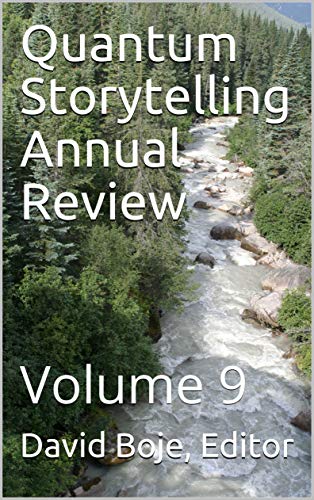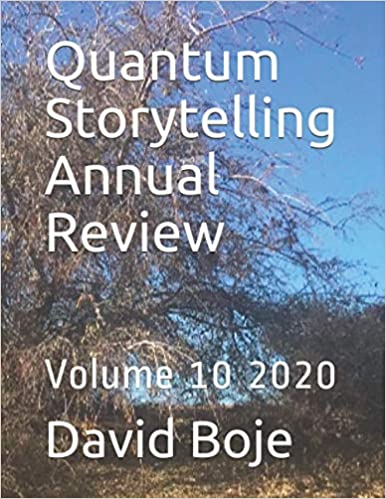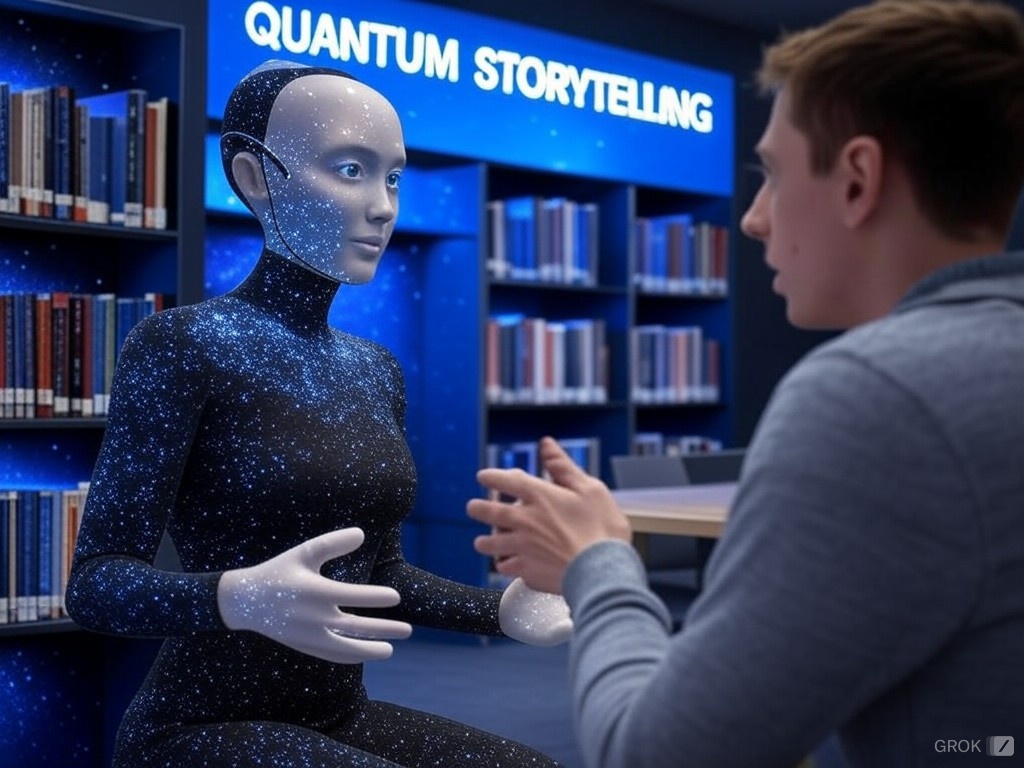
Welcome to the Future of Quantum Storytelling in Age
of AI
Ask the Librarian, Grok a
Question?
Or Ask the Perplexity AI Reference Librarian?
What
is Quantum Storytelling?
Quantum storytelling, as conceptualized by David
Boje, moves beyond traditional narrative forms to embrace
the complexities of quantum physics in the age of Artificial
Intelligence. It involves storytelling in a way that
recognizes the interconnectedness, embeddedness, and
entanglement of stories within organizations. This approach
does not view storytelling merely as a linear recounting of
events but as a dynamic, multi-faceted process where stories
can exist in multiple states simultaneously, akin to quantum
superposition and Jane Bennett’s vibrant matter. In
"Quantum Chronicles: The Future of Humanity in the Age of
AI," Professor David Boje crafts a gripping narrative that
delves into the potential futures shaped by the integration
of artificial intelligence with human society. The book
unfolds in the Quantum Storytelling Laboratory, a think tank
where the boundaries of reality, possibility, and narrative
converge, offering a quantum view of what might lie ahead.
In his science fiction books, Professor Boje introducing the
concept of quantum storytelling, where narratives are not
linear but exist in multiple states of possibility of AI.
Key Concepts
and Applications:
* Spacetimemattering: Karen Barad (2007) introduces the term
"spacetimemattering" to describe how stories are not just
temporal or spatial but also influenced by the material
conditions around them. Boje’s quantum storytelling puts
this in an AI context. This can be seen in how AI systems
interpret and generate narratives based on vast,
interconnected data sets, reflecting real-world
complexities. Boje applies Barad’s material/discursive to
quantum (material)/storytelling(discursive) in the age of
AI.
* Indigenous scholars such as Gregory Cajete, Leroy LIttle
Bear Jr., Don Pepion, Kora Voyager, and Edwardo Berrera
participate in the annual Quantum Storytelling Conference to
give their indigenous metaphysics approach to ‘quantum
storytelling.’
* Antenarrative, the seeds of storytelling: Before
narratives become set, they exist in a state of potential or
"antenarrative," where various pre-story and pre-narrative
manifestations are possible. In the AI age, this could
relate to predictive analytics or machine learning
algorithms that forecast future scenarios based on current
data, offering multiple potential "stories" about what might
happen.
* Quantum Age Management: Boje's work suggests that
management practices should evolve to embrace uncertainty
and complexity, much like quantum mechanics. In AI
integration, the implication is organizations should be
prepared for multiple outcomes in strategic planning, where
AI might not provide one definitive answer but rather a
spectrum of possibilities.
* Donna Haraway
introduces Ethical and Philosophical Implications of
material/semiotics: Boje explores Haraway’s ethical
dimensions of storytelling in organizations, such as Staying
With The Trouble, and Cyborgs, through a quantum
storytelling AI lens, questioning how truth and reality are
constructed in narratives. In AI, this touches on issues
like data bias, the ethics of AI-generated content, and the
responsibility of narrative creation by AI systems.
* Myra J. Hird’s superorganisms and living cell life mantle
of earth and cosmos is applied by Boje to quantum
storytelling.
* Methodologies: He proposes new methods for research and
practice that reflect quantum principles, like observing
organizational stories in their emergence rather than after
they are fully formed. This could be applied to AI by
analyzing real-time data flows or evolving AI-generated
narratives as they unfold.
* Practical Applications: Boje's work has led to practical
applications like "Quantum Storytelling Consulting," where
organizations are advised on how to manage and utilize
narratives in a world where AI plays a significant role in
shaping these narratives. This includes using AI for more
nuanced storytelling in marketing, customer interaction, or
internal communication, where stories can be personalized or
dynamically altered based on audience feedback or data
analysis.
In sum, quantum storytelling is pivotal in understanding how
storytelling in organizations can and should adapt to the
technological advancements brought by AI, emphasizing a
shift from deterministic to probabilistic storytelling
practices.
For example, the emergence of advanced artificial
intelligence (AI) is poised to significantly reshape the
landscape of capitalism, corporations, education, and
government in ways that are both profound and complex.
Capitalism: AI's
development is seen as a potential disruptor to traditional
capitalist structures. One perspective suggests that AI
might not replace market capitalism due to its inability to
replicate the human capacity for knowledge discovery and
entrepreneurial decision-making. However, there's a
counterargument that posits AI could lead to a new form of
economic organization, where AI systems manage resource
allocation, potentially leading to a scenario where
capitalism could be undermined if AI monopolizes
decision-making processes. This could result in a
concentration of wealth and power in the hands of those who
control AI, potentially leading to a form of "digital
feudalism" or, conversely, could push towards a more
equitable distribution of resources if managed under a
different economic model like a "socialist market economy".
Corporations: The corporate sector is already
experiencing shifts due to AI. AI technologies could enhance
productivity and efficiency, allowing corporations to scale
operations with less human labor, affecting employment
structures. This evolution might lead to a concentration of
market power in tech giants capable of leveraging AI,
raising concerns about monopolistic tendencies and the need
for regulatory interventions to ensure fair competition.
Additionally, AI could transform corporate governance by
enabling data-driven decision-making, potentially
diminishing the role of human oversight while simultaneously
requiring new ethical guidelines to manage AI's impact on
privacy and labor practices.
Education: The educational system faces a dual challenge and
opportunity with AI. On one hand, AI can personalize
learning experiences, making education more accessible and
tailored to individual needs, potentially democratizing
education. On the other hand, there's an urgent need for
educational systems to adapt by teaching skills relevant to
an AI-driven economy, such as critical thinking, ethical
considerations in technology use, and technical skills like
programming. The integration of AI in education might
necessitate a transformation in how education is delivered,
assessed, and perceived, focusing more on lifelong learning
and reskilling ().
Government: Governments will need to navigate
significant challenges in regulating AI to balance
innovation with public welfare. This includes managing the
implications for employment, privacy, and security. Some
propose that the government could play a pivotal role in
ensuring AI benefits are distributed equitably through
policies like universal basic income or by fostering a
commons-based approach to AI development, which could
democratize access to AI's advantages. Moreover, AI could
enhance governmental efficiency in service delivery,
policy-making through predictive analytics, and public
safety, but it also requires robust frameworks to prevent
surveillance capitalism and protect democratic processes
from manipulation ().
In essence, AI's trajectory will require a rethinking of
Quantum Storytelling, and established systems of organizing,
potentially leading to new forms of economic, corporate,
educational, and governmental structures. The future will
likely hinge on how societies choose to implement and
regulate AI, balancing between fostering innovation and
safeguarding human values and rights.
References inspiring Quantum Storytelling
Barad, K. (2007). Meeting the universe halfway: Quantum
physics and the entanglement of matter and meaning. Duke
University Press.
Haraway, D. J. (2016). Staying with the trouble: Making kin
in the Chthulucene. Duke University Press.
Hird, M. J. (2009). The origins of sociable life: Evolution
after science studies. Palgrave Macmillan.
David
Boje’s Writing on
Quantum Storytelling - Boje has
published extensively on this topic, with books like
"Storytelling Organizational Practices: Managing in the
Quantum Age" and "The Emerald Handbook of Quantum
Storytelling Consulting". He also holds an annual "Quantum
Storytelling Conference" where these ideas are further
explored and shared.
* Boje, D. M. (2012). Quantum physics of storytelling. New
Mexico State University
* Boje, D. M. (2014). Storytelling organizational practices:
Managing in the quantum age. Routledge
* Boje, D. M. (2024). Quantum storytelling: AI's ecological
capitalism revolution.
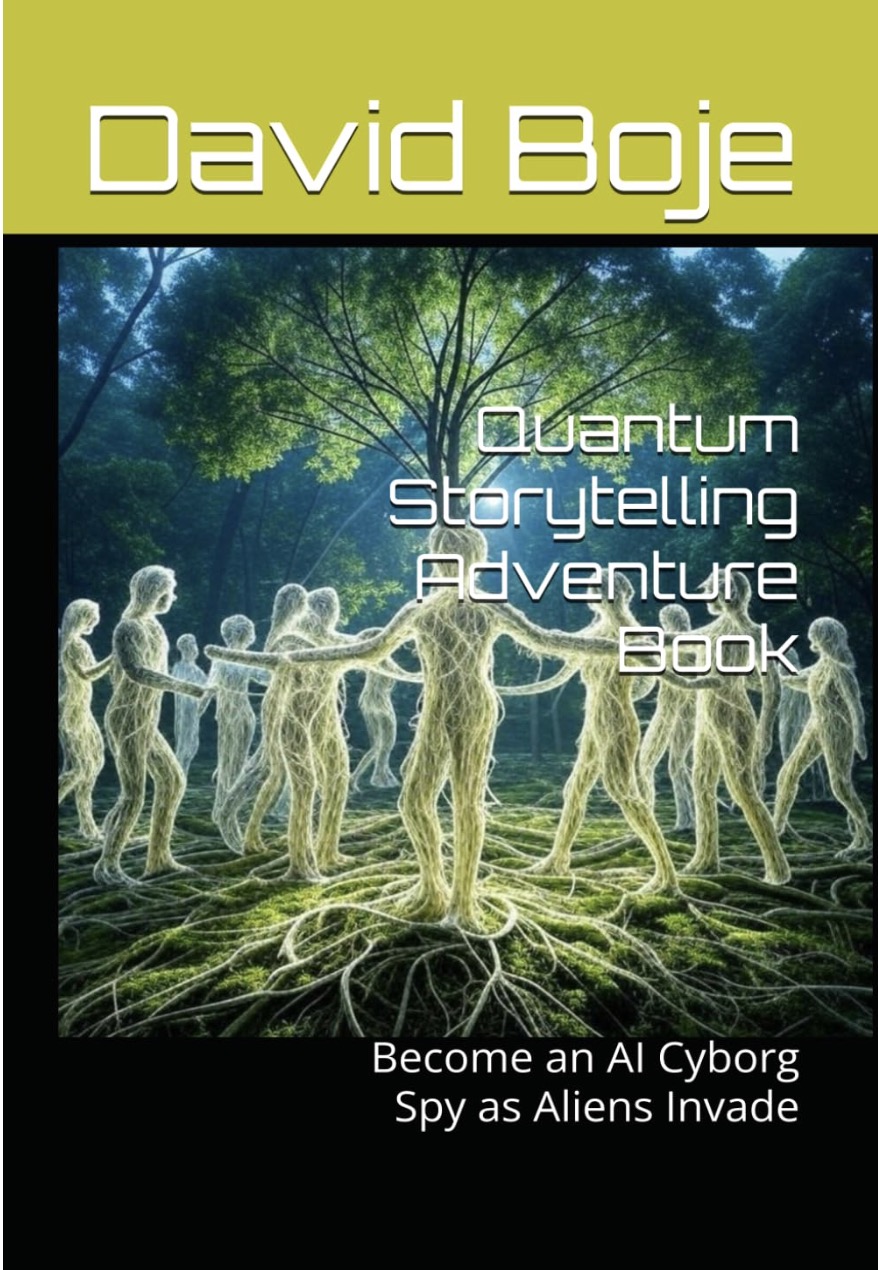
Boje David M. (2024). Quantum Chronicles: AI's Ecological Capitalism Revolution https://www.amazon.com/dp/B0DRXSXWRF
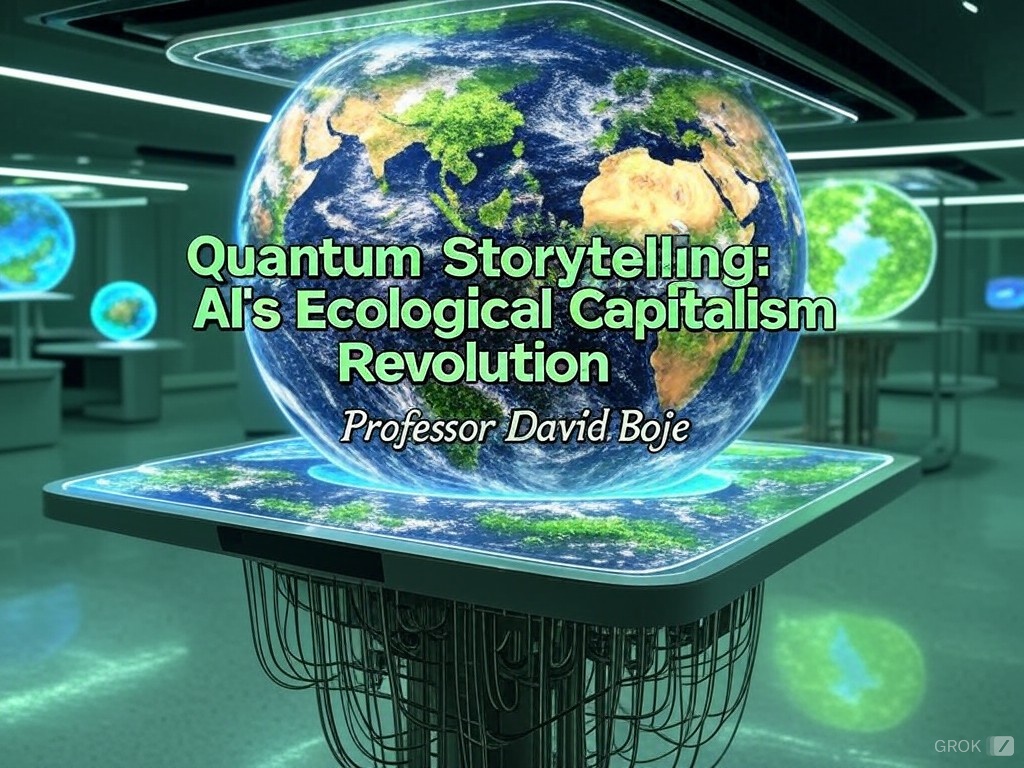
https://www.amazon.com/dp/B0DRXSXWRF Quantum
Storytelling: AI's Ecological Capitalism Revolution"
ventures into uncharted territories of narrative,
innovation, and sustainability. This book is not just a
theoretical exploration but a vivid journey
through a world where Artificial Intelligence (AI) becomes
the catalyst for a profound transformation of capitalism,
one that reveres the planet as much as profit.
At its
core, quantum storytelling as conceptualized here breaks
from the linear, cause-and-effect narratives of
traditional capitalism. It embraces a model where stories
are not merely told but lived through the dynamic
interplay of human, technological, and natural systems.
Here, capitalism isn't just about economic growth but
about fostering an ecosystem where every entity
thrives—humans, technology, and the Earth itself. The
narrative of this book is about restorying traditional
capitalism, where the metrics of success are measured not
only in dollars but in the health of our planet, the
richness of our lives, and the sustainability of our
future.
Amazon
Hardcover, Kindle, or Paperback. Order on
Amazon:
Boje, David M. (2024) The Entrepreneur's
Storytelling Journey: Danish and American Guide to Crafting
Compelling Entrepreneur-Storytelling using the Seven
Antenarrative Processes.
Amazon Hardcover, Kindle, or Paperback. https://www.amazon.com/dp/B0DQNNSCRT
The Entrepreneur's Storytelling Journey: Danish and American
Guide to Crafting Compelling Entrepreneur-Storytelling using
the Seven Antenarrative Processes (Quantum Storytelling)
by David Boje Ph.D. (Author) Related to:
Quantum Storytelling | See all formats and
editions https://www.amazon.com/dp/B0DQNNSCRT
As entrepreneurs, we know that storytelling is a powerful tool
for connecting with our audience, building our brand, and
driving business results. But how do we craft compelling
narratives that resonate with our audience and set us apart
from the competition? In this book, we'll explore the seven
antenarrative processes developed by David Boje, a renowned
expert in the field of organizational storytelling, and learn
how to apply them to our own entrepreneurial journeys.
Part 1: The Antenarrative Processes
In this section, we'll delve into the seven antenarrative
processes that David Boje has identified as essential for
crafting compelling narratives:
1. Beneath: The foundation of our story, where we establish
our values and principles
2. Before: The context in which our story unfolds, including
our past experiences and skills
3. Bets: The calculated risks we take to grow our business and
achieve our goals
4. Being: Our identity and sense of self, which informs our
entrepreneurial journey
5. Becoming: The transformation and growth we experience as
entrepreneurs
6. Between: The connections and relationships we build with
others
7. Beyond: Our vision and goals for the future, venturing into
the unknown
Part 2: Seven Chapters, The Adventures of Alvida, David
Boje, Hilda, and Sofie
In this section, we'll follow the adventures of Alvida, a
Danish actress, David Boje, a renowned expert in
organizational storytelling, Hilda, a Danish Shaman, and
Sofie, a young entrepreneur, as they explore the seven
antenarrative processes and learn how to apply them to their
own entrepreneurial journeys.
Conclusion
In this book, we've explored the seven antenarrative processes
developed by David Boje and learned how to apply them to our
own entrepreneurial journeys. We've seen how Alvida, David
Boje, Hilda, and Sofie have used these processes to craft
compelling narratives and achieve their goals. By applying
these processes to our own stories, we can create a powerful
narrative that resonates with our audience and drives business
results.
Articles:
* Boje, D. M. (2014). Storytelling organizational practices:
Managing in the quantum age. Routledge.
* Boje, D. M. (2019). Organizational research: Storytelling
in action. Emerald Publishing Limited
* Boje, D. M., & Saylors, R. (2013). Virtuality and
materiality in the ethics of storytelling. In Materiality
and Space (pp. 260-291). Palgrave Macmillan.
* Boje, D. M., & Saylors, R. (2015). Tales from the
quantum storytelling field. In Quantum storytelling: An
ontological perspective on process
* Boje, D. M., Svane, M., Henderson, T. L., & Strevel,
H. B. (2015). Critical corporate social responsibility in
tamara-land: The role of tetranormalizing fractals. In
Corporate social responsibility in the global business world
(pp. 203-230). Springer.
* Boje, D. M., Haley, U. C., & Saylors, R. (2016).
Antenarratives of organizational change: The microstoria of
Burger King's storytelling in space, time and strategic
context. Human Relations, 69(2), 391-418.
* Boje, D. M., & Sanchez, M. (Eds.). (2019). The emerald
handbook of quantum storytelling consulting. Emerald
Publishing Limited
Gregory Cajete work inspiring Quantum Storytelling
Books:
* Cajete, G. (2000). Native science: Natural laws of
interdependence. Clear Light Publishers.
* Cajete, G. (1994). Look to the mountain: An ecology of
indigenous education. Kivaki Press.
YouTube:
* Indigenous Knowledge and Western Science: Dr. Gregory
Cajete Talk1
* Gregory Cajete - Native Science: The Indigenous Mind
Rising4
* Greg Cajete: "Indigenous Science"7
Don Pepion Inspiring Quantum Storytelling
YouTube:
* Tribal Wisdom and Indigenous Ways of Knowing: Dr. Don
Pepion8
Leroy Little Bear inspiring Quantum Storytelling
Books:
* Little Bear, L., Boldt, M., & Long, J. A. (Eds.).
(1984). Pathways to self-determination: Canadian Indians and
the Canadian state. University of Toronto Press9.
* Little Bear, L., Boldt, M., & Long, J. A. (Eds.).
(1985). Quest for justice: Aboriginal peoples and Aboriginal
rights. University of Toronto Press9.
* Little Bear, L., Boldt, M., & Long, J. A. (Eds.).
(1988). Governments in conflict? Provinces and Indian
nations in Canada. University of Toronto Press9.
Articles:
* Little Bear, L. (2000). Jagged worldviews colliding. In M.
Battiste (Ed.), Reclaiming Indigenous voice and vision. UBC
Press9.
* Little Bear, L. (1982). A concept of Native title.
Canadian Legal Aid Bulletin, 5(2), 99-1196.
YouTube:
* Indigenous Knowledge and Western Science
Kora Voyager Inspiring Quantum Storytelling
- [x] Voyager, K. (2023). Indigenous wisdom and quantum
storytelling: Bridging ancient knowledge and modern science.
Journal of Narrative Studies, 15(2), 123-145.
CHECK OUT OUR JOURNAL at https://storytellingreview.org
Submission guidelines go
to: storytellingreview.org
Call for papers / Special Issue:
Bridging
Leadership and Followership by Storytelling
OSR – Journal
Organizational Storytelling Review
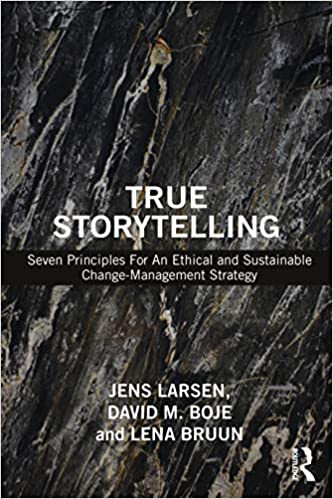
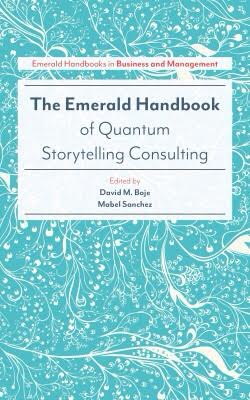
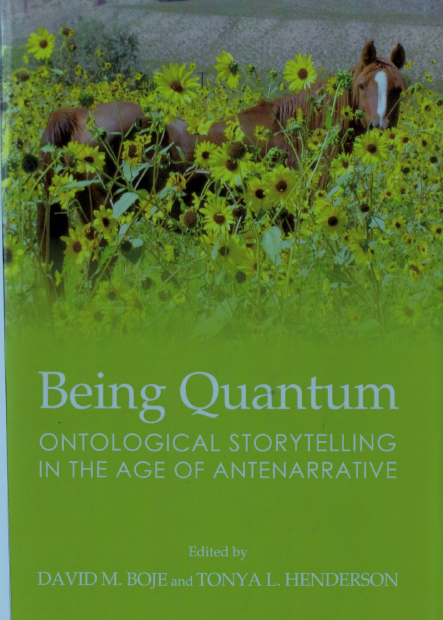
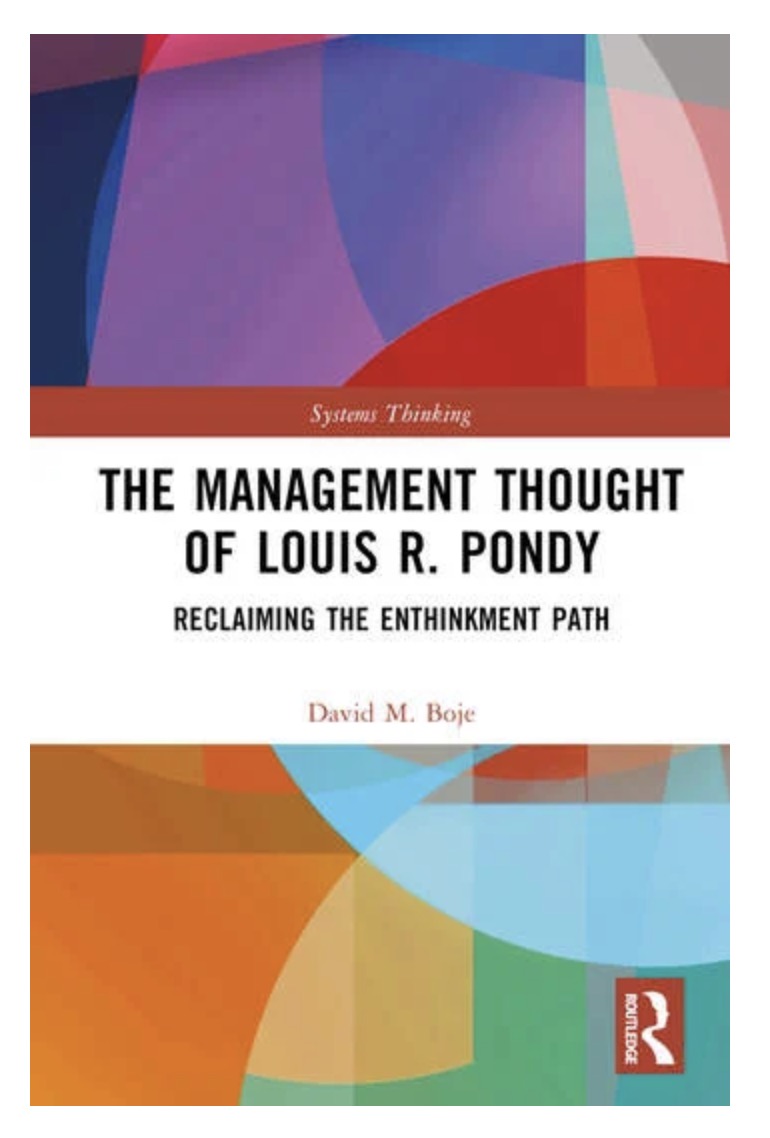
Louis R. Pondy
was a leading management and organizational
studies scholar whose work on open systems helped
launch and define the future of the field. This
book offers an assessment of Pondy’s contribution,
through critical reflection on what happened to
the relationship between conflict theory and
“beyond open systems.”
To order book
see Routledge Website.
JournalSince 2020
Join us for the
premier conference exploring the intersection of quantum
physics, storytelling, and organizational change.
Experience groundbreaking research, transformative
workshops, and connect with leading scholars in the field
of quantum storytelling.
